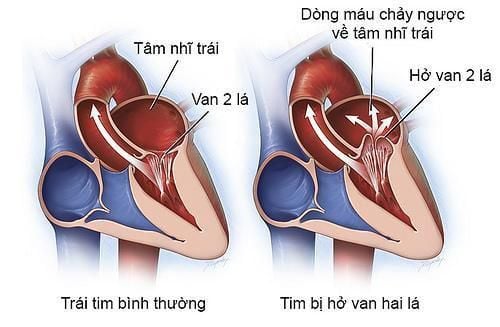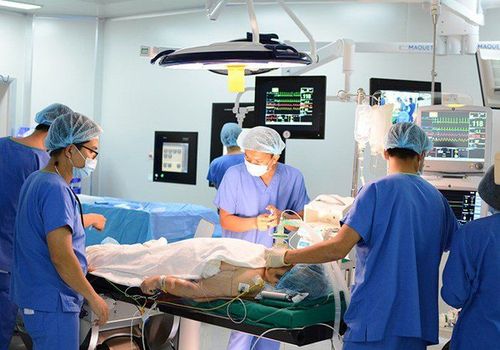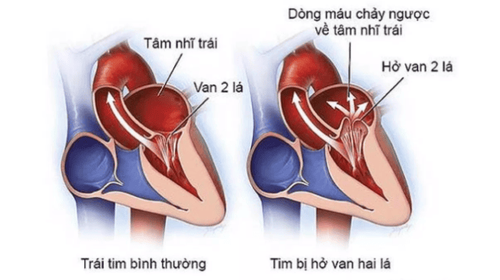This is an automatically translated article.
The article is professionally consulted by the Doctor of Cardiology Interventional Unit, Vinmec Times City International General Hospital.Mitral regurgitation is a dangerous disease but can be controlled if detected and treated properly. The treatment regimen for mitral regurgitation depends on each case because the degree of regurgitation, the impact of the disease, and the health status of each person is different.
1. Is mitral regurgitation dangerous?
Mitral regurgitation is a condition in which the mitral valve does not close properly. Normally, blood from the heart will be pumped to the circulatory system, but with mitral valve regurgitation, blood will flow back from the cleft to the left atrium, affecting cardiovascular activity. Valve regurgitation 2 is (HoHL) is a fairly common disease, usually divided into two types: real HoHL (due to rheumatic heart disease, endocarditis, complications of myocardial infarction...) or functional HoHL (due to dilation. left ventricular chamber...).
Hở van 2 lá khiến máu chảy ngược về tim
Mitral regurgitation 1 ⁄4: This is a mild degree of mitral regurgitation. If the patient has no symptoms, no treatment is required. If the patient feels fatigue, shortness of breath, sharp pain in the chest, it is necessary to conduct treatment immediately. Mitral regurgitation 2/4: When you have mitral regurgitation of this degree, you need to treat it early so that the disease does not get worse. Mitral regurgitation 3⁄4: This is a severe degree of mitral regurgitation, often accompanied by symptoms of angina, heart palpitations, shortness of breath, palpitations, fatigue, and dry cough. Patients need to be examined regularly to control the disease condition and treat as soon as possible. In many cases, the heart valve needs to be replaced. Mitral regurgitation 4/4: The most severe condition of mitral regurgitation, which can be life-threatening. What is needed: Repair, replace the heart valve or actively treat.
2. Treatment methods for mitral regurgitation
The treatment regimen for mitral regurgitation is developed by the doctor based on: the degree of valve regurgitation, accompanying symptoms, causes of mitral regurgitation and the patient's health status and comorbidities. Treatment methods for mitral regurgitation include:2.1. Drug treatment
For patients with chronic mitral regurgitation without clinical symptoms, there is no specific medical regimen, nor is there a clinical trial to evaluate the effectiveness of medical treatment with vasodilators. In the absence of hypertension, there is no indication for the use of vasodilators or ACE inhibitors in patients with asymptomatic mitral regurgitation with compensated left ventricular function. However, with functional mitral regurgitation or ischemic heart disease, preload reduction therapy is also effective.Patients with mitral regurgitation with left ventricular systolic dysfunction are treated with some drugs or biventricular pacing, which reduces the severity of mitral regurgitation. function.

Điều trị nội khoa phải tuân thủ theo chỉ định của bác sĩ
2.2. Mitral valve replacement surgery
Mitral valve replacement surgery is a major surgery, opening the chest with an artificial heart-lung machine, often applied with severely damaged heart valves, patients with symptoms that can be dangerous.Two types of replacement valves are used: mechanical valves and biological valves. However, each type of valve has certain disadvantages.
Mechanical valve (valve made from metal): When replacing a mechanical valve, the patient will have to take vitamin K anticoagulants for life, many risks of bleeding Biological valves (valves made from biological products such as bovine pericardium or pig heart): The effectiveness of the biovalve will decrease over time.
2.3. Mitral valve repair surgery
It is a surgery that helps the mitral valve close, restores mitral valve function, preserves myocardial function, and limits the disadvantages of mitral valve replacement surgery. This is a more complicated surgery than mitral valve replacement surgery, requiring modern machines and highly specialized skills.2.4. Transcatheter mitral valve repair (Mitra-clip):
Mitra-clip: This method of treating mitral valve disease of Vinmec is highly appreciated with a worldwide success rate of up to 95%, the rate of complications after surgery. technique is very low. Not opening the chest, but doctors only use a catheter, through a blood vessel, to bring the instrument into the heart to clamp the mitral valve.3. Why should we treat mitral valve prolapse at Vinmec Times City?

Điều trị hở van tim 2 lá tại Bệnh viện Đa khoa Quốc tế Vinmec
Please dial HOTLINE for more information or register for an appointment HERE. Download MyVinmec app to make appointments faster and to manage your bookings easily.













